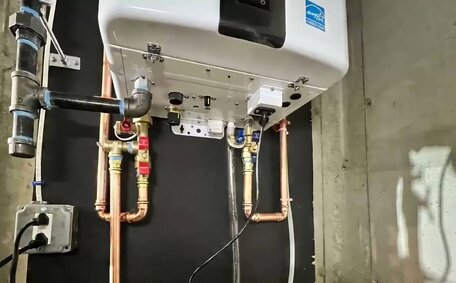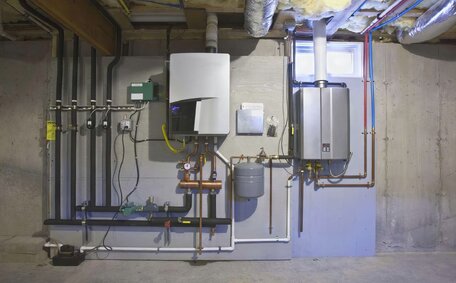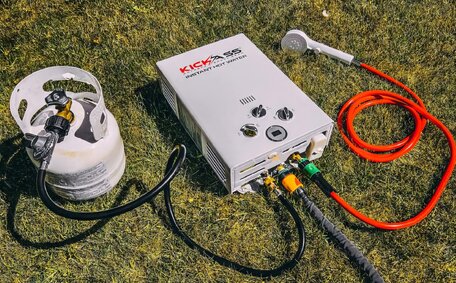Identifying the causes of smelly drains
Drains typically become smelly due to accumulated organic matter like hair, soap residue, fats, oils, and food remnants. This accumulation can clog pipes over time, fostering biofilm growth. This leads to a biofilm coating the drains and pipes which, coupled with decomposing organic matter, emits nasty odours.
Other problems your sewer line and floor drains might encounter include:
- Improper drain installations causing excessive backup of odorous gases
- Cracked pipes leaking sewage into the structure
- Invasive tree roots clogging the drain lines
- Overuse of kitchen sink garbage disposals leading to food waste blockages and drainage backups
Whilst certain blocked drains can be managed with your own methods like boiling water, baking soda, and vinegar, persistent or severe odours likely indicate more critical issues, implying the necessity for a comprehensive cleaning of your plumbing system. In these cases, cleaning your blocked sewer might necessitate a call to a plumber to properly inspect, diagnose, and repair the underlying problem.
Buildup of organic matter
The accumulation of substances like food scraps, oils, and grease can culminate in a smelly sink drain. Food and grease residue can adhere to sinks and pipes, constricting water flow. Drain flies, mould, and bacteria then accumulate in these deposits, breaking the material down and releasing foul-smelling gases into your drains.
Regularly pour boiling water down the drain post-meal to prevent residue buildup. Thoroughly scrape dishes before washing them, and avoid allowing food particles or dish soap to go down the drain. Using a small amount of baking soda and vinegar can also help dissolve deposits and control the smell your drains exude.
Ensuring that soapy water flows through your pipes regularly, helps maintain a neutral odour in your drains. Consider installing sink strainers to catch debris.
Should your drain odours persist despite preventative efforts, it’s probable your blocked sewer needs a deep clean to alleviate bad odours.
You might wonder, 'Why does my kitchen sink still smell?' if simple home remedies like boiling water aren’t enough to clear longstanding buildup. When dealing with a stubborn blocked drain, hiring a specialist plumber to snake the drain and hydrojet built-up areas is the most effective means to banish foul odours for good.
Blockages and partial clogs
An array of common causes smelly drains such as hair, grease, and food remnants are often found coming your drain, leading to blockages and malodorous issues. As substances build up, they narrow the pipe diameter and impede water flow. Slow drainage allows solids to settle, and bacteria to flourish, releasing sulphurous gases responsible for the foul smell emanating from your drains.
A plunger can dislodge minor clogs in bathroom and kitchen sinks to restore flow. To prevent blockages, avoid disposing fats, oils and excess food down sink and shower drains. Baking soda followed by vinegar can break up minor obstructions in kitchen and bathroom drains.
However, ongoing or significant clogs often indicate deeper problems requiring professional repair to clear the buildup in your pipes and can get rid of persistent odours. Drain snaking and high-pressure jetting, which can meticulously remove the root cause of blockages, years of grimy accumulation. Regular maintenance checks prevent future blockages and keep odours at bay.
Issues with pipes and plumbing
Another source of foul drain odours is incorrect plumbing installation. Missing or improperly installed components like P traps, vents, and drain lines allow sewer gases to escape into the home. Outdated plumbing in older homes may not comply with current standards.
Missing P-traps, which block odours, can result in foul smells entering the home. Insufficient venting causes pressure imbalances that draw undesirable smells into your house through the drains. Cross-connections between waste and supply lines or backflows also spread contamination.
These plumbing dilemmas can cause your home to fill with bad smells which demand professional intervention, especially when the odours persist beyond simple home remedies. A licenced plumber can inspect for violations, provide fixes like installing proper vents and p-traps, ensure drain slope standards are met, and confirm no cross-connections exist. They can also camera inspect drain lines and use smoke testing to identify breaches for targeted sealing.
Upgrading substandard plumbing to current codes prevents hazardous odours, ensuring unobstructed water flow and improved drainage and health.
Sewer gases entering the home
Sewer gases, originating from decaying matter and containing methane and hydrogen sulphide, are unsavoury and dangerous odours that can infiltrate your home through drains.
Proper venting is essential to prevent sewer gases from entering your home, as these can rise up through your pipes and permeate your plumbing systems. Vents ensure gases are safely expelled outdoors and also balance air pressure within the pipes to prevent unwanted odours. Cracks, dodgy connections, or clogged vents can become outlets for the smell coming your way from the plumbing into your domicile.
The reliable water trap, also known as a sewer gas trap, becomes a crucial barrier when it comes to utilising water to block gases from surging upstream. Plumbers evaluate venting, p-traps, and pipe integrity since these components can compromise and lead to odours.
Over time, grease and waste can clog your traps, negating their odour-blocking function. That’s why scheduling annual drain inspections is recommended.
If you notice a rotten egg stench suggesting sewer gas, run cold water to check for dry P-traps in your sink drain. Flushing water down the drain for a few minutes can refill them and eliminate any lingering drain smell. However, constant drain odor might indicate venting problems or cracks in the drainage system, requiring professional repair.
DIY methods to clean smelly drains
There are a few DIY methods using common household products that can help clean smelly drains:
- Baking Soda and Vinegar - Pour 1⁄2 cup baking soda down the drain followed by 1 cup white vinegar, a home remedy to get rid of smelly spots. Seal the drain for a spell, letting the fizzing reaction work its wonders to break up gunk and rid smelly nuisances. Then pour a kettle of boiling water to flush residue, providing a straightforward approach to rid smelly drains.
- Salt and Baking Soda - Mix 1⁄2 cup salt with 1⁄2 cup baking soda and pour down the drain. Let sit 30 minutes before flushing with hot water.
- Boiling Water - Boiling 2-3 kettles of water and pouring it down the drain can melt fat deposits that have been used for cooking and kill bacteria and odours.
When using products to freshen air in your bathroom, ensure safe handling without mixing chemicals. Always use gloves and safety glasses, and ensure the area is well-ventilated. While useful for mild odours, it’s important to recognise that persistent or severe smells, which products like mineral oil might not resolve, could signal more serious issues requiring professional repair.
Preventing future smelly drain issues
When it comes to preventing unpleasant smells, they can often be achieved with some straightforward routines. Using sink strainers to collect food scraps and debris is an easy way to manage drain odours. Regularly emptying strainers into the bin is an effective method to keep your kitchen clean. Steer clear of pouring fats, oils, or other greasy substances down drains. Run hot water for a minute down your sink after meal prep to clear residue.
Also, Tip 1⁄2 cup of baking soda followed by 1 cup of vinegar down drains monthly to cleanse your pipes, blending the power of baking soda vinegar to keep them fresh and your garbage disposal operating optimally.
Consider products like microbial drain cleaners that digest organics and keep drains fresh between deeper cleanings. Enzymatic formulas break down oils, fats, hair soap scum and food waste that get stuck in your drains causing odours.
While screens and monthly upkeep are beneficial, scheduling biannual professional drain cleaning by a plumber is advisable. They can hydrojet any adhered muck and perform thorough drain cleaning to pinpoint early indications of clogs. Routine maintenance is the best prevention against smelly drain headaches.
When to call a professional plumber
Contact Croydon Park Plumbing if regular solutions do not remedy the smelly issues in your bathroom sink or drains. Recurring sewage smell, gurgling sounds, very slow drainage or signs of water backing up also indicate professional help is needed.
As licenced experts serving Sydney for over 10 years, our plumbers have the advanced tools and skills to diagnose causes smelly drains and provide reliable solutions. We can hydro jet drains, clear obstructions, repair pipe damage, upgrade deficient plumbing to code or resolve venting issues allowing sewer gases inside.
To request smelly drain troubleshooting or any other residential/commercial plumbing service, call Croydon Park Plumbing at 1300 349 338 or email jobs@croydonparkplumbingservices.com.au. With 24/7 availability for emergencies, we ensure that your plumbing concerns are done right, offering prompt assistance and long-lasting relief from unpleasant drain odours.






